J. David Core's Blog, page 15
September 14, 2015
Author Interview: Stephen Childs, Author of On Track for Murder
Stephen Childs was born in Ealing, London, in November 1961.
In the early 1970’s Stephen’s parents moved the family to New Zealand. Stephen’s education was completed in Wellington, New Zealand, after which he began a long career in film and television.
 Stephen’s career highlights cover news and current affairs, documentaries, sport and even drama productions. Over the years he realized that a career of observing and reporting on others’ efforts, successes and failures, furnished him with an excellent understanding of ‘how people tick’.A foray into politics, where he actually stood as a candidate in the New Zealand general election, adds to his colorful career.
Stephen’s career highlights cover news and current affairs, documentaries, sport and even drama productions. Over the years he realized that a career of observing and reporting on others’ efforts, successes and failures, furnished him with an excellent understanding of ‘how people tick’.A foray into politics, where he actually stood as a candidate in the New Zealand general election, adds to his colorful career.
Stephen rose to executive level in his television career and managed many successful ventures. A hankering for greater personal challenge eventually led him to seek a change. This change came when he and his family decided to relocate to Perth, Western Australia.
Leaving his well paid executive role and relocating to a different country gave Stephen the opportunity to utilize his skills in the way he had dreamed of for some time: writing full length fiction.
Stephen lives in Joondalup, just north of Perth, in Western Australia, with his family and two cats. And yes, there is a pool in the back yard.
Who are your influences?My writing influence sits between two very different authors: Agatha Christie, and Matthew Reilly. I know it’s a struggle to place both of these greats in the same camp, but I dream of mixing such diverse styles and coming up with something quite special. I love the language Christie uses, and her intricately woven plot lines that so effortlessly allow the story to unfold. Then I am gripped by Reilly’s non-stop action and seemingly impossible situations. Having said that, an influence that I drew upon many times when writing is Alfred Hitchcock and his fabulous movies. I would often consider his use of mood, and the way he builds tension, when searching for a way to enhance a scene.
Thinking away from the creative, I am also a great admirer of Richard Branson. I find his ability to challenge accepted norms and seek a better way, to be most refreshing. And … I’d quite like to own my own island.
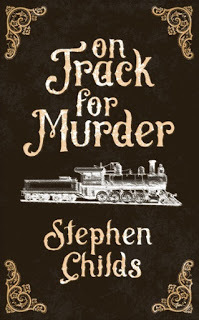 When did you begin writing? As a child I loved writing. I would start devising adventure stories whenever a spare notebook found its way into my possession. But I tended to struggle advancing a story past the first few scenes. I believed the story should be perfect from the very beginning, which, of course, never happened. But I persevered and ended up with a stack of notebooks containing a single chapter each.
When did you begin writing? As a child I loved writing. I would start devising adventure stories whenever a spare notebook found its way into my possession. But I tended to struggle advancing a story past the first few scenes. I believed the story should be perfect from the very beginning, which, of course, never happened. But I persevered and ended up with a stack of notebooks containing a single chapter each.
My first job took me into the world of television news, which has a tendency to monopolise all personal time. I attempted to recommence writing many times, but without success. The intention was strong, but time fought dirty.
After moving into the management side of the company, my desire to write was realised. But, unfortunately, these efforts were limited to reports, proposals, and technical documentation.
About four years ago my wife and I made the decision to leave the stresses of executive life, and seek a more relaxed lifestyle. We relocated to Perth and began to work on our dreams. Mine took me to writing. The full length novel was begun. Simple!
How do you come up with your stories, characters, character names, POV, etc?Essentially, the first thing I see is a situation. Something out of the ordinary. Then I imagine the lead up to it, and the subsequent after effects. With On Track for Murder, I had been investigating my own family tree and become fascinated by stories of individuals who moved from England to Australia. This drove an interest in the location and the time period. Interestingly, it was rumours of intrigue around my great grandmother’s life that triggered the idea for a female lead.
The situations that I write stem from ideas seeded during my days in the news media. Fires, kidnappings, explosions, even murder, are all events that have their roots in stories I covered over the years. The way people react in such situations always intrigued me. My writing drew quite a lot from recollections of stressed and hurting victims.
Names are difficult when writing historical novels, as they need to be appropriate for the era. I gained significant mileage from my family tree research. I noted down an appealing selection of first names and surnames from census data and birth records, then played around with various combinations. Some seemed to work, some didn’t. With Ridley Dunning, the name immediately jumped out at me as I played with the options.
Do you work from an outline?I begin working to an outline but find the story keeps stubbornly trying to head off in its own direction.
Keeping the initial premise in mind, I devise the ending, then note any important hit points needed to drive the story. The plot plan ends up as a group of must have scenarios through which the characters must navigate. How they get from one part to another often baffles me. I will finish a writing session and say to myself: “where did that come from?” As I'm writing, I feel that I am more coercing the characters in the direction I need, than directing them at every turn.
Tell me about your favorite scene in your novel.With the railway theme of the title, it will probably come as little surprise that my favourite scene involves the steam locomotive. This is where Abigail takes the train, in an effort to escape from one of the baddies. I loved providing Abigail with the unheard of ability to drive a train. Abigail hasn’t touched a locomotive since her father allowed her to have a go at the controls years before. Yet, in this scene she is forced to pull out her hidden knowledge, or suffer at the hands of a potential killer. The scene peaks as she manages to effect her escape, and the villain is left stumbling along behind, attempting to catch the fleeing locomotive. For me, the scene evokes a sense of triumph: not only Abigail’s triumph over the criminal, but also her triumph over personal fears. In a way, it hints at the courage Abigail is required to draw on to survive the upcoming challenges.
Can you tell us a little about your writing philosophy?I set out to simply write a good story. Oddly, I am greatly motivated by airport bookshops. I imagine my reader sitting on a plane, immersing themselves in an easy to read story that takes them on a journey away from their immediate surroundings. I write what I would like to read. Having spent so much time writing factual business documents, I find it refreshing to allow my mind to run free. And run it does.
Have you ever tried writing in any other genres?I did manage to complete a rather long manuscript which took the lead character through a series of time travel events. It was actually a combination of stories I had devised spanning three different time periods, across four different countries. The style was, in a way, reminiscent of a Michael Crichton novel. My intention was more to learn what worked and what didn’t, than to publish. I believe, in this, it was a success. I may look at adapting the story one day and putting it out as a finished work. Or it may just languish on the dusty back shelf forever.
Do you have any interesting writing-related anecdotes to share?In my previous executive role, a frequent task involved writing complex proposals and funding requests. Occasionally, differences of opinion emerged between myself and my colleagues over the direction we should take. At times, I was required to provide plans and strategies that I disagreed with. This writing took a lot of effort. I would get frustrated and end up staring at the computer screen with a blank mind. To get my brain working I would write down the first thing that came into my head, usually a fictional scenario of some kind. This was later deleted but got my fingers busy and my mind in gear.
On one such occasion I had written three paragraphs of pure fancy about equipment suddenly gaining the ability to snoop on underperforming staff. Then my computer froze! Nothing I could do would convince the errant device to cooperate. So the I.T. help-desk was called. A technician dutifully attended and suggested I grab a coffee while he performed his magic. Several minutes later I returned, cup in hand, to find the technician sitting with a wide smirk across his face, reading my work of fiction. “You should take this up properly,” he quipped as he handed me back my seat. I had been sprung, and sunk into abject embarrassment. But the experience seeded an idea. And eventually, I heeded his sage advice.
On Track for Murder is available at Amazon, Barnes & Noble, and wherever books are sold.
In the early 1970’s Stephen’s parents moved the family to New Zealand. Stephen’s education was completed in Wellington, New Zealand, after which he began a long career in film and television.
 Stephen’s career highlights cover news and current affairs, documentaries, sport and even drama productions. Over the years he realized that a career of observing and reporting on others’ efforts, successes and failures, furnished him with an excellent understanding of ‘how people tick’.A foray into politics, where he actually stood as a candidate in the New Zealand general election, adds to his colorful career.
Stephen’s career highlights cover news and current affairs, documentaries, sport and even drama productions. Over the years he realized that a career of observing and reporting on others’ efforts, successes and failures, furnished him with an excellent understanding of ‘how people tick’.A foray into politics, where he actually stood as a candidate in the New Zealand general election, adds to his colorful career. Stephen rose to executive level in his television career and managed many successful ventures. A hankering for greater personal challenge eventually led him to seek a change. This change came when he and his family decided to relocate to Perth, Western Australia.
Leaving his well paid executive role and relocating to a different country gave Stephen the opportunity to utilize his skills in the way he had dreamed of for some time: writing full length fiction.
Stephen lives in Joondalup, just north of Perth, in Western Australia, with his family and two cats. And yes, there is a pool in the back yard.
On Track for Murder, a Victorian mystery by Stephen Childs
When 18-year-old Abigail Sergeant’s father is stabbed to death and her brother is caught with the incriminating, bloody weapon, Abigail finds herself on a dangerous cross country adventure to uncover the truth about who killed her father. On Track for Murder is a beguiling blend of romance, mystery and a desperate race against time and will entertain fans of Agatha Christie and P. D. James with its plot twists and turns, leaving them guessing — and gasping — until the very last page.
Who are your influences?My writing influence sits between two very different authors: Agatha Christie, and Matthew Reilly. I know it’s a struggle to place both of these greats in the same camp, but I dream of mixing such diverse styles and coming up with something quite special. I love the language Christie uses, and her intricately woven plot lines that so effortlessly allow the story to unfold. Then I am gripped by Reilly’s non-stop action and seemingly impossible situations. Having said that, an influence that I drew upon many times when writing is Alfred Hitchcock and his fabulous movies. I would often consider his use of mood, and the way he builds tension, when searching for a way to enhance a scene.
Thinking away from the creative, I am also a great admirer of Richard Branson. I find his ability to challenge accepted norms and seek a better way, to be most refreshing. And … I’d quite like to own my own island.
 When did you begin writing? As a child I loved writing. I would start devising adventure stories whenever a spare notebook found its way into my possession. But I tended to struggle advancing a story past the first few scenes. I believed the story should be perfect from the very beginning, which, of course, never happened. But I persevered and ended up with a stack of notebooks containing a single chapter each.
When did you begin writing? As a child I loved writing. I would start devising adventure stories whenever a spare notebook found its way into my possession. But I tended to struggle advancing a story past the first few scenes. I believed the story should be perfect from the very beginning, which, of course, never happened. But I persevered and ended up with a stack of notebooks containing a single chapter each. My first job took me into the world of television news, which has a tendency to monopolise all personal time. I attempted to recommence writing many times, but without success. The intention was strong, but time fought dirty.
After moving into the management side of the company, my desire to write was realised. But, unfortunately, these efforts were limited to reports, proposals, and technical documentation.
About four years ago my wife and I made the decision to leave the stresses of executive life, and seek a more relaxed lifestyle. We relocated to Perth and began to work on our dreams. Mine took me to writing. The full length novel was begun. Simple!
How do you come up with your stories, characters, character names, POV, etc?Essentially, the first thing I see is a situation. Something out of the ordinary. Then I imagine the lead up to it, and the subsequent after effects. With On Track for Murder, I had been investigating my own family tree and become fascinated by stories of individuals who moved from England to Australia. This drove an interest in the location and the time period. Interestingly, it was rumours of intrigue around my great grandmother’s life that triggered the idea for a female lead.
The situations that I write stem from ideas seeded during my days in the news media. Fires, kidnappings, explosions, even murder, are all events that have their roots in stories I covered over the years. The way people react in such situations always intrigued me. My writing drew quite a lot from recollections of stressed and hurting victims.
Names are difficult when writing historical novels, as they need to be appropriate for the era. I gained significant mileage from my family tree research. I noted down an appealing selection of first names and surnames from census data and birth records, then played around with various combinations. Some seemed to work, some didn’t. With Ridley Dunning, the name immediately jumped out at me as I played with the options.
Do you work from an outline?I begin working to an outline but find the story keeps stubbornly trying to head off in its own direction.
Keeping the initial premise in mind, I devise the ending, then note any important hit points needed to drive the story. The plot plan ends up as a group of must have scenarios through which the characters must navigate. How they get from one part to another often baffles me. I will finish a writing session and say to myself: “where did that come from?” As I'm writing, I feel that I am more coercing the characters in the direction I need, than directing them at every turn.
Tell me about your favorite scene in your novel.With the railway theme of the title, it will probably come as little surprise that my favourite scene involves the steam locomotive. This is where Abigail takes the train, in an effort to escape from one of the baddies. I loved providing Abigail with the unheard of ability to drive a train. Abigail hasn’t touched a locomotive since her father allowed her to have a go at the controls years before. Yet, in this scene she is forced to pull out her hidden knowledge, or suffer at the hands of a potential killer. The scene peaks as she manages to effect her escape, and the villain is left stumbling along behind, attempting to catch the fleeing locomotive. For me, the scene evokes a sense of triumph: not only Abigail’s triumph over the criminal, but also her triumph over personal fears. In a way, it hints at the courage Abigail is required to draw on to survive the upcoming challenges.
Can you tell us a little about your writing philosophy?I set out to simply write a good story. Oddly, I am greatly motivated by airport bookshops. I imagine my reader sitting on a plane, immersing themselves in an easy to read story that takes them on a journey away from their immediate surroundings. I write what I would like to read. Having spent so much time writing factual business documents, I find it refreshing to allow my mind to run free. And run it does.
Have you ever tried writing in any other genres?I did manage to complete a rather long manuscript which took the lead character through a series of time travel events. It was actually a combination of stories I had devised spanning three different time periods, across four different countries. The style was, in a way, reminiscent of a Michael Crichton novel. My intention was more to learn what worked and what didn’t, than to publish. I believe, in this, it was a success. I may look at adapting the story one day and putting it out as a finished work. Or it may just languish on the dusty back shelf forever.
Do you have any interesting writing-related anecdotes to share?In my previous executive role, a frequent task involved writing complex proposals and funding requests. Occasionally, differences of opinion emerged between myself and my colleagues over the direction we should take. At times, I was required to provide plans and strategies that I disagreed with. This writing took a lot of effort. I would get frustrated and end up staring at the computer screen with a blank mind. To get my brain working I would write down the first thing that came into my head, usually a fictional scenario of some kind. This was later deleted but got my fingers busy and my mind in gear.
On one such occasion I had written three paragraphs of pure fancy about equipment suddenly gaining the ability to snoop on underperforming staff. Then my computer froze! Nothing I could do would convince the errant device to cooperate. So the I.T. help-desk was called. A technician dutifully attended and suggested I grab a coffee while he performed his magic. Several minutes later I returned, cup in hand, to find the technician sitting with a wide smirk across his face, reading my work of fiction. “You should take this up properly,” he quipped as he handed me back my seat. I had been sprung, and sunk into abject embarrassment. But the experience seeded an idea. And eventually, I heeded his sage advice.
On Track for Murder is available at Amazon, Barnes & Noble, and wherever books are sold.
Published on September 14, 2015 09:35
August 31, 2015
Audiobook Review: FLESH: The Disappearance of Portia Barrington by Keith Lee Johnson
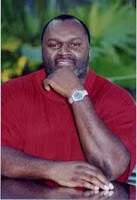 Keith Lee JohnsonPortia Barrington is the 15-year-old daughter of a high-powered defense attorney, and she's been kidnapped. Those who took her have demanded and been paid two ransoms, but now they are demanding a third so, despite the kidnappers' warnings to the contrary, the FBI has been called in. Enter Agent Phoenix Drew-Perry, a woman of color with her own daughter in turmoil.
Keith Lee JohnsonPortia Barrington is the 15-year-old daughter of a high-powered defense attorney, and she's been kidnapped. Those who took her have demanded and been paid two ransoms, but now they are demanding a third so, despite the kidnappers' warnings to the contrary, the FBI has been called in. Enter Agent Phoenix Drew-Perry, a woman of color with her own daughter in turmoil.The story is told in a combination of third person and first. Half of the story is Phoenix' personal first person recollections. The other half is from an omniscient third person point-of-view; a technique I personally find distracting. Pick a PoV and stick with it, I say, but I understand that this is becoming a popular story-telling modus. I just find it off-putting and lazy.
The author relies heavily on cliches. I swear I heard the phrase "Off the hook!" more times in the first chapter than a Mel B outtake-reel from America's Got Talent. Also the book references the sex act so frequently that the author often relies on such over-used erotica standards as "get all up in that," and "on fire down there."
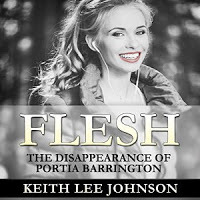 There are a number of other weird aspects to the book. It's clearly written to titillate, but at the end, the heroine goes into a long puritanical aside about how over-sexed and debauched Americans are. Another example of the book's weirdness is that a character in the book is named Christopher Chance, and one of the protagonists assumes it's a false identity because it's such a cheesy name. This in a book with characters named Phoenix, Portia Barrington, Topaz, Vanderbilt, Myles, Palmer, and Savannah.
There are a number of other weird aspects to the book. It's clearly written to titillate, but at the end, the heroine goes into a long puritanical aside about how over-sexed and debauched Americans are. Another example of the book's weirdness is that a character in the book is named Christopher Chance, and one of the protagonists assumes it's a false identity because it's such a cheesy name. This in a book with characters named Phoenix, Portia Barrington, Topaz, Vanderbilt, Myles, Palmer, and Savannah. Lucinda Gainey
Lucinda GaineyIn another example, the story makes overly specific use of the story-line of a 1970 film called The Grasshopper starring
One thing I did enjoy about the book was a clever plot element where the FBI agents were able to determine the reason why the kidnappers kept demanding more and more ransom. But then, by the end of the book even that became a plot hole. I don't want to post a spoiler, but suffice to say you don't lead a horse to water if you don't want him to take a drink.
Overall, I wasn't impressed with the story or the writing, but apparently I'm in the minority. The author has a substantial following, and numerous glowing reviews on this title alone in the paperback and eBook listings at Amazon. Personally, I'm not recommending it, but what do I know? Twenty plus horny housewives can't be wrong.
Amazon, Audible
Published on August 31, 2015 05:00
August 25, 2015
Meet This Thriller Author
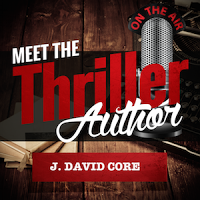 I was recently interviewed by thriller author, Alan Peterson, for his podcast, Meet the Thriller Author. We talk about my influences, where story ideas come from, and my podcast, The Thrills and Mystery Podcast. Have a listen.
I was recently interviewed by thriller author, Alan Peterson, for his podcast, Meet the Thriller Author. We talk about my influences, where story ideas come from, and my podcast, The Thrills and Mystery Podcast. Have a listen.Direct download
Books I mention in the interview: The Quartzsite Trip, Do Black Patent Leather Shoes Really Reflect Up?
Published on August 25, 2015 14:52
I was recently interviewed by thriller author, Alan Peter...
 I was recently interviewed by thriller author, Alan Peterson, for his podcast, Meet the Thriller Author. We talk about my influences, where story ideas come from, and my podcast, The Thrills and Mystery Podcast. Have a listen.
I was recently interviewed by thriller author, Alan Peterson, for his podcast, Meet the Thriller Author. We talk about my influences, where story ideas come from, and my podcast, The Thrills and Mystery Podcast. Have a listen.Direct download
Published on August 25, 2015 14:52
August 22, 2015
Guest Post: Unique DNA Search Catches the Grim Sleeper by DJ Swykert
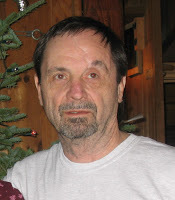 DJ Swykert The underlying theme in The Death of Anyone, Melange Books, poses the Machiavellian question: Does the end justify the means? Bonnie Benham, the lead detective in my story, has her own answer. But the legality of this question will be answered in a real life courtroom in the California trial of a serial killer dubbed by the media: The Grim Sleeper. Lonnie David Franklin, the Grim Sleeper, was caught because his son’s DNA was the closest match to DNA collected at the crime scenes in the database. Investigating Franklin’s son led them to investigate Lonnie Franklin. But there was no direct DNA evidence that linked Lonnie to the crime scene until they obtained a sample from him after his arrest. Lonnie Franklin will be the first person in the U.S. to ever stand trial for murder based on this type of evidence, and its admissibility issues will be thoroughly tested by defense attorneys. Only two states at this time, California and Colorado, have a written policy concerning the use of Familial DNA in an investigation. The admission of Familial DNA, with its potential Fourth Amendment violations, has never been tested in court. The California trial of Lonnie David Franklin will become a landmark case for the future use of Familial DNA Searches by law enforcement agencies nationwide.
DJ Swykert The underlying theme in The Death of Anyone, Melange Books, poses the Machiavellian question: Does the end justify the means? Bonnie Benham, the lead detective in my story, has her own answer. But the legality of this question will be answered in a real life courtroom in the California trial of a serial killer dubbed by the media: The Grim Sleeper. Lonnie David Franklin, the Grim Sleeper, was caught because his son’s DNA was the closest match to DNA collected at the crime scenes in the database. Investigating Franklin’s son led them to investigate Lonnie Franklin. But there was no direct DNA evidence that linked Lonnie to the crime scene until they obtained a sample from him after his arrest. Lonnie Franklin will be the first person in the U.S. to ever stand trial for murder based on this type of evidence, and its admissibility issues will be thoroughly tested by defense attorneys. Only two states at this time, California and Colorado, have a written policy concerning the use of Familial DNA in an investigation. The admission of Familial DNA, with its potential Fourth Amendment violations, has never been tested in court. The California trial of Lonnie David Franklin will become a landmark case for the future use of Familial DNA Searches by law enforcement agencies nationwide.
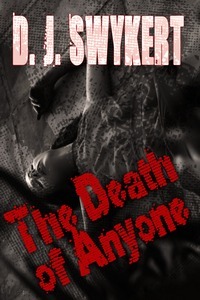 This is an update on the legal progress of the trial. Franklin was arrested on July 7, 2010, The Los Angeles District Attorney’s Office charged him with ten counts of murder, one count of attempted murder, and special circumstance allegations of multiple murders in the cases. A grand jury indictment was issued on March 23, 2011. The Grim Sleeper has been resting comfortably in jail since his arrest awaiting trial; the large quantity of evidence in this case, some dating back thirty years, has caused a lengthy pretrial discovery. The trial was originally scheduled to begin the summer of 2014, but was put on hold. It was rescheduled for June 30, 2015, but that didn’t happen. On Monday August 17, 2015, at a pretrial hearing, the trial was rescheduled for October 14, 2015.
This is an update on the legal progress of the trial. Franklin was arrested on July 7, 2010, The Los Angeles District Attorney’s Office charged him with ten counts of murder, one count of attempted murder, and special circumstance allegations of multiple murders in the cases. A grand jury indictment was issued on March 23, 2011. The Grim Sleeper has been resting comfortably in jail since his arrest awaiting trial; the large quantity of evidence in this case, some dating back thirty years, has caused a lengthy pretrial discovery. The trial was originally scheduled to begin the summer of 2014, but was put on hold. It was rescheduled for June 30, 2015, but that didn’t happen. On Monday August 17, 2015, at a pretrial hearing, the trial was rescheduled for October 14, 2015. I first heard of the technique while working as a 911 operator in 2006. It came up in a conversation with officers. I thought at the time it would make an interesting premise for a book. I began writing the mystery some three years later after leaving the department. I had just finished editing a first draft of The Death of Anyone in the summer 2010 when news of The Grim Sleeper’s capture in Los Angeles was released. I read with interest all the information pouring out of L.A.regarding the investigation and the problems confronting prosecutors. All of which are explored in The Death of Anyone. In my fictional story Detroit Detective Bonnie Benham has been transferred from working undercover in narcotics to homicide and is working the case of a killer of adolescent girls. She is a straight forward investigator who describes herself as a blonde with a badge and a gun. CSI collects DNA evidence from the scene of the latest victim, which had not been detected on the other victims; but no suspect turns up in the FBI database. Due to the notoriety of the crimes a task force is put together with Bonnie as the lead detective, and she implores the D.A. to use an as yet unapproved type of a DNA Search in an effort to identify the killer. The Death of Anyone is available on the Melange Books website and also on Amazon.com in Kindle and print formats.
Bio:DJ Swykert is a former 911 operator writing and living in the Cincinnati area. His work has appeared in The Tampa Review, Detroit News, Coe Review, Monarch Review, The Newer York, Lunch Ticket, Gravel, Zodiac Review, Barbaric Yawp and Bull. His books include Children of the Enemy, Alpha Wolves, The Pool Boy’s Beatitude and The Death of Anyone. You can find him at: www.magicmasterminds.com/djswykert
He is a wolf expert.
Published on August 22, 2015 07:48
August 14, 2015
Final Weekend for All 5 eBooks Under $12
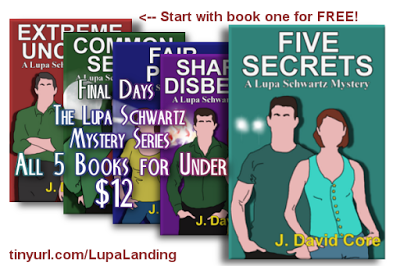 After this weekend all prices return to normalAs you know - or should know if you actually read my blog ;) - The fifth book in the Lupa Schwartz mystery series, Five Secrets, dropped last month. The eBook version was released at the introductory price of $2.99 and the prices of books 2,3, and 4 were set to match. Book one is free in eBook, so all five books were available for less than $12. On Monday, the prices will begin returning to normal. Book one will remain free indefinitely as an incentive for new readers of the series, but book's 2, 4 and 5 will all be increasing in price. Book 2 will be $3.99 and books 4 and 5 will each be $4.99.
After this weekend all prices return to normalAs you know - or should know if you actually read my blog ;) - The fifth book in the Lupa Schwartz mystery series, Five Secrets, dropped last month. The eBook version was released at the introductory price of $2.99 and the prices of books 2,3, and 4 were set to match. Book one is free in eBook, so all five books were available for less than $12. On Monday, the prices will begin returning to normal. Book one will remain free indefinitely as an incentive for new readers of the series, but book's 2, 4 and 5 will all be increasing in price. Book 2 will be $3.99 and books 4 and 5 will each be $4.99.So get the series NOW while you still have the chance to save. Find the links to your favorite retailer at tinyurl.com/LupaLanding
Published on August 14, 2015 13:35
August 7, 2015
Audiobook Review: An Eye for Murder by Libby Fischer Hellmann
I was provided this audiobook at no charge by the author, publisher, and/or narrator in exchange for an unbiased review via AudiobookBlast.com
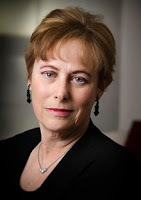 Libby Fischer HellmannEllie Foreman is a recently divorced woman with a tweener daughter and an aging father to care for. She works as a film director for a small independent production company in Chicago, and her greatest claim to fame is a small regional history piece she produced for the mayor a few years back. Everything is getting to a normal place in her life, when three unrelated incidences converge to force her world to come undone.
Libby Fischer HellmannEllie Foreman is a recently divorced woman with a tweener daughter and an aging father to care for. She works as a film director for a small independent production company in Chicago, and her greatest claim to fame is a small regional history piece she produced for the mayor a few years back. Everything is getting to a normal place in her life, when three unrelated incidences converge to force her world to come undone.
First she receives a request from a TEA Party candidate for the governorship to produce a bio-pic which the campaign hopes will introduce the candidate to the voters. Next, her ex-husband brings her the bad news that he is having financial difficulties due to a poor investment decision which threatens his ability to contribute to her financially. Finally, an unknown elderly woman calls to inform her that upon the death of an aged border, Ellie’s name was found amid the dead man’s possessions, and she believes that Ellie may be the intended heir of his meager belongings.
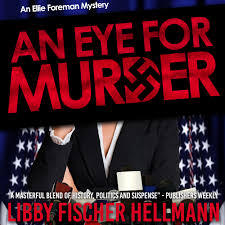 How these three otherwise minor incidences play out to bring Ellie to the brink of bankruptcy and involve her in a 65 year-old conspiracy to revive Hitler’s final solution makes for a fast paced, and colorful tale. Along the way we meet Ellie’s Syrian gardener, a handsome stranger named David, an Hispanic woman with secrets of her own, the charismatic leader of a Neo-Nazi Church, and a young boy who hopes the library might be his ticket out of gang life; as well as a number of other peripheral characters who all have a part to play in this tightly told yarn.
How these three otherwise minor incidences play out to bring Ellie to the brink of bankruptcy and involve her in a 65 year-old conspiracy to revive Hitler’s final solution makes for a fast paced, and colorful tale. Along the way we meet Ellie’s Syrian gardener, a handsome stranger named David, an Hispanic woman with secrets of her own, the charismatic leader of a Neo-Nazi Church, and a young boy who hopes the library might be his ticket out of gang life; as well as a number of other peripheral characters who all have a part to play in this tightly told yarn.
Capably voiced by Karyn O’Bryant, the audio version of An Eye for Murder by Libby Fisher Hellmann is not overly produced with sound effects and distracting mood music, which I always appreciate. The story did require some accent work, and a little emotional depth from the narrator, all of which Ms O’Bryant handled masterfully. In fact, for the whole of the production, I was only pulled out of the narration at one point during a scene describing how Ellie dealt with an unrealized romantic moment. During a few paragraphs where Ellie describes how she brought herself to completion, the narration felt just a little disconnected. Karyn O'Bryant
Karyn O'Bryant
There are also a few very minor issues with the story. For one, I find it very difficult to believe that the liberal daughter of a Jewish WWII survivor would be easily swayed to believe that a TEA Party darling could be even a little bit pro-union and pro-choice and still have party backing. There’s also a short scene describing in too much detail how Ellie chooses to hide a copy of an old document. She hid it in a seldom used window-well. That’s all we need to know. But these two issues and a few other quibbles are nothing to complain about.
Overall, the story is satisfying and believable and entertaining. All the things one wants in an audio thriller. This is billed as the first in the series of Ellie Foreman mysteries. It might be worthwhile checking out the rest.
Amazon, Audible
 Libby Fischer HellmannEllie Foreman is a recently divorced woman with a tweener daughter and an aging father to care for. She works as a film director for a small independent production company in Chicago, and her greatest claim to fame is a small regional history piece she produced for the mayor a few years back. Everything is getting to a normal place in her life, when three unrelated incidences converge to force her world to come undone.
Libby Fischer HellmannEllie Foreman is a recently divorced woman with a tweener daughter and an aging father to care for. She works as a film director for a small independent production company in Chicago, and her greatest claim to fame is a small regional history piece she produced for the mayor a few years back. Everything is getting to a normal place in her life, when three unrelated incidences converge to force her world to come undone.First she receives a request from a TEA Party candidate for the governorship to produce a bio-pic which the campaign hopes will introduce the candidate to the voters. Next, her ex-husband brings her the bad news that he is having financial difficulties due to a poor investment decision which threatens his ability to contribute to her financially. Finally, an unknown elderly woman calls to inform her that upon the death of an aged border, Ellie’s name was found amid the dead man’s possessions, and she believes that Ellie may be the intended heir of his meager belongings.
 How these three otherwise minor incidences play out to bring Ellie to the brink of bankruptcy and involve her in a 65 year-old conspiracy to revive Hitler’s final solution makes for a fast paced, and colorful tale. Along the way we meet Ellie’s Syrian gardener, a handsome stranger named David, an Hispanic woman with secrets of her own, the charismatic leader of a Neo-Nazi Church, and a young boy who hopes the library might be his ticket out of gang life; as well as a number of other peripheral characters who all have a part to play in this tightly told yarn.
How these three otherwise minor incidences play out to bring Ellie to the brink of bankruptcy and involve her in a 65 year-old conspiracy to revive Hitler’s final solution makes for a fast paced, and colorful tale. Along the way we meet Ellie’s Syrian gardener, a handsome stranger named David, an Hispanic woman with secrets of her own, the charismatic leader of a Neo-Nazi Church, and a young boy who hopes the library might be his ticket out of gang life; as well as a number of other peripheral characters who all have a part to play in this tightly told yarn.Capably voiced by Karyn O’Bryant, the audio version of An Eye for Murder by Libby Fisher Hellmann is not overly produced with sound effects and distracting mood music, which I always appreciate. The story did require some accent work, and a little emotional depth from the narrator, all of which Ms O’Bryant handled masterfully. In fact, for the whole of the production, I was only pulled out of the narration at one point during a scene describing how Ellie dealt with an unrealized romantic moment. During a few paragraphs where Ellie describes how she brought herself to completion, the narration felt just a little disconnected.
 Karyn O'Bryant
Karyn O'BryantThere are also a few very minor issues with the story. For one, I find it very difficult to believe that the liberal daughter of a Jewish WWII survivor would be easily swayed to believe that a TEA Party darling could be even a little bit pro-union and pro-choice and still have party backing. There’s also a short scene describing in too much detail how Ellie chooses to hide a copy of an old document. She hid it in a seldom used window-well. That’s all we need to know. But these two issues and a few other quibbles are nothing to complain about.
Overall, the story is satisfying and believable and entertaining. All the things one wants in an audio thriller. This is billed as the first in the series of Ellie Foreman mysteries. It might be worthwhile checking out the rest.
Amazon, Audible
Published on August 07, 2015 08:00
August 3, 2015
Author Interview: Harry Longstreet, Author of Falling Birds
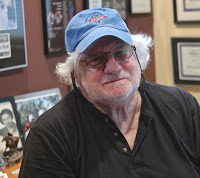 Harry Longstreet retired after twenty-five years as a writer, producer and director of filmed entertainment, primarily for television. For the past ten years he has pursued ‘humanist realism’ photography… still pushing film through a camera but one frame at a time instead of 24 frames a second. He has received two Writers Guild of America nominations for script writing, as well as a Humanitas Nomination and a Genesis Award for an after-school special he co-wrote and directed. Aside from one-man shows, his award winning photography has appeared in over two-hundred National and International Juried Exhibitions. “Falling Birds” is his first published work. “Blood in the Water”, the second in the GYB series is a work in progress. He lives on Bainbridge Island, WA.
Harry Longstreet retired after twenty-five years as a writer, producer and director of filmed entertainment, primarily for television. For the past ten years he has pursued ‘humanist realism’ photography… still pushing film through a camera but one frame at a time instead of 24 frames a second. He has received two Writers Guild of America nominations for script writing, as well as a Humanitas Nomination and a Genesis Award for an after-school special he co-wrote and directed. Aside from one-man shows, his award winning photography has appeared in over two-hundred National and International Juried Exhibitions. “Falling Birds” is his first published work. “Blood in the Water”, the second in the GYB series is a work in progress. He lives on Bainbridge Island, WA.Falling birds is described as follows:“Falling Birds”, is the first in a series featuring “GYB” [Got Your Back] an agency specializing in protection and investigative services. The three principals of the Los Angeles firm; (Tracy-ex-military, Jake ex-mobster, Dave ex-cop washout) and their bizarre contract confederate, Grodsky, an infamous paparazzo. The agency works to protect a ‘Jeans Queen’ designer from a psychopathic stalker. At the same time, Jake is the subject of a contract hit ordered by a dying mob boss he is responsible for putting in prison and Grodsky searches for the killer of a film star he once loved.
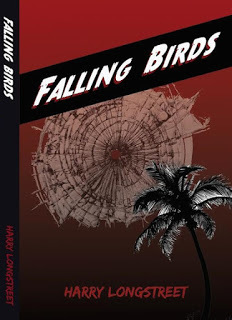 Who are your influences?Elmore Leonard, Lawrence Block, Robert Parker, Donald Westlake [Richard Stark] Ross Thomas, William Murray, John D. MacDonald
Who are your influences?Elmore Leonard, Lawrence Block, Robert Parker, Donald Westlake [Richard Stark] Ross Thomas, William Murray, John D. MacDonaldWhen did you begin writing?As a teenager but I realized how imitative my work was and gave it up. Later, in my thirties I became involved in writing again as a corporate PR executive and later the transition to fiction wasn’t too difficult. I was a writer-producer-director (mostly TV) for twenty-five years. Episodes and movies for television got five kids through college.
How do you come up with your stories, characters, character names, POV, etc?Everything we see, hear, read goes into a conscious and subconscious collective. You draw on it and travel both old and new roads looking for story first… the rest will follow (hopefully). Not easy to be fresh but always trying.
Do you work from an outline?Not yet… I’m still stealing the notions and plots from all those showbiz years that worked, didn’t work or got rejected.
Tell me about your favorite scene in your novel.All the ones that still make me laugh no matter how many times I read them… but the ones with the gourmand pair of contract killers was fun to write and read.
Can you tell us a little about your writing philosophy?Have fun and don’t be afraid to take chances or offend.
Have you ever tried writing in any other genres?As noted…25 years in the TV vineyard and one feature destroyed by four subsequent re-writes. Welcome to Hollywood.
Do you have any interesting writing-related anecdotes to share? Too many and I don’t want to get sued… but I’ll share one without names. Pitching to a “show runner” in an interview to come aboard as a producer… offered a slew of story ideas. Loves two of them, would we (wife partner) write that episode? Reminded him we are interviewing for the producing opening. OK, he’ll think it over. Next day a good friend is telling us she also interviewed for a script assignment on that same show and she got the gig! Great we say what did you pitch. She didn’t, they gave her a two element story. Yep, the same two we had pitched the day before. She was a good friend and we let it go… took a different show. Welcome to Hollywood.
You can find Harry on Facebook. You can also check out , and his photography. And his book is is available on Amazon.
Published on August 03, 2015 09:00
July 27, 2015
Guest Post: A Success Story by Mike Dennis
First and foremost, I want to convey my deep appreciation to JD (Dave) Core for giving me the opportunity to tell my little story on his site.
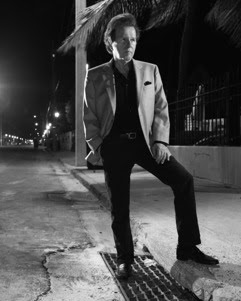 And what a story it was! Well, for me, anyway. Since my latest reinvention of myself (and there have been many over the long years) as an audiobook narrator, I was hot to move up the ladder. Of course, I didn't kid myself. I knew I had to have a worthy product ¾skillful storytelling, quality sound production, and knowledge of my own strengths and weaknesses as a narrator ¾ if I was to achieve any success at all. The first thing I learned was the learning curve is steep.
And what a story it was! Well, for me, anyway. Since my latest reinvention of myself (and there have been many over the long years) as an audiobook narrator, I was hot to move up the ladder. Of course, I didn't kid myself. I knew I had to have a worthy product ¾skillful storytelling, quality sound production, and knowledge of my own strengths and weaknesses as a narrator ¾ if I was to achieve any success at all. The first thing I learned was the learning curve is steep.
So after a couple of years, I get a handle on sound crafting and I hone my natural ability to tell a story. Then one day in the summer of 2014, I was trolling Amazon and came across Mickey Spillane's I, The Jury. The cover was typical Spillane: a gorgeous doll coming out of her clothes while a guy holds a gun on her. Then ¾ whoa! ¾ I noticed there was no audiobook attached to it.
Positive I had made a mistake, I looked again. No audiobook. I went to Audible.com and typed in the title. No results. There was an audiocassette on Amazon dating back to the Paleolithic Era for sale by a third party vendor, but no modern downloadable audio version. Could this be true? I, The Freaking Jury, the first Mike Hammer novel and the biggest selling book of Spillane's entire career, does not appear in audiobook form?
Well, it was true, all right. I looked up the other Hammer books. Nearly all of them were available as audiobooks and those were all narrated by Stacy Keach, who played Mike Hammer on TV for years. I mean, the guy is Mike Hammer!
I set out to become the narrator for this novel. First, I had to find out who held the audio rights. I wrote to my friend Max Allan Collins, novelist and Spillane collaborator, and he essentially told me to forget it. Simon & Schuster had the audio rights to all the Hammer novels, he said, and they had released them with Stacy Keach's powerful voice driving them. He said it would probably be just a matter of time before they got around to I, The Jury.
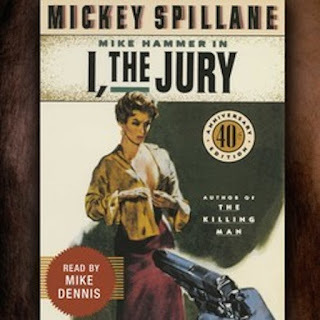 Okay, not good news. But I kept after it, anyway. Fruitless efforts at contacting Simon & Schuster yielded nothing. After a lot of digging into the bowels of their website, however, I turned up the name of the head of their audiobook division. I called S&S, asked for him, and to my surprise, I had him on the line.
Okay, not good news. But I kept after it, anyway. Fruitless efforts at contacting Simon & Schuster yielded nothing. After a lot of digging into the bowels of their website, however, I turned up the name of the head of their audiobook division. I called S&S, asked for him, and to my surprise, I had him on the line.
Once I collected myself, I explained who I was: an audiobook narrator/producer operating out of my home studio in Key West, and I wanted the chance to narrate and produce I, The Jury.
Now, this is the point where a guy like him would tell a guy like me, "We don't work with home studio narrators," or "We use movie stars to narrate our audiobooks," or "Buzz off, kid." And you know, you couldn't blame him if he did. Not even I could blame him. But instead, he said, "Do you deliver a finished product?"
Knowing that I had now arrived at my date with destiny, I said "Yes. But how about if I send you a brief recorded excerpt of I, The Jury? That way you can not only get an idea of how I would approach the material, but also of my sound quality." He paused for what felt like forever, then said, "Okay." And he gave me his email address.
I carefully prepared a recorded piece from the novel and sent it off to him. Frankly, though, I was sure that the minute he hung up the phone, he was shouting into his intercom, "Get me Stacy Keach!"
A couple of months went by. I was certain the game was over. But one day I opened my email to find a response. He had sent my sample to the head of their production department for her opinion. My God, I still had a shot!
Two more months go by (they sure move slowly up there in New York), and one day I get an email from the head of S&S audio production. She liked my sample, but she asked if I wouldn't mind submitting a finished version of the entire first chapter, so they could get a better idea of my sound and my consistency, as well as how I would handle more dialogue. I really couldn't believe it!
Of course, I did the first chapter, laboring over it lovingly and with great precision. Another month later, she writes back and offered me the job. We agreed on the terms and I narrated and produced the audiobook. It'll be released in unabridged form Wednesday, July 28. And you know, I still can't believe I'm actually the voice of Mike Hammer.
Available for pre-order now on Amazon. http://tinyurl.com/p6et4qp
 And what a story it was! Well, for me, anyway. Since my latest reinvention of myself (and there have been many over the long years) as an audiobook narrator, I was hot to move up the ladder. Of course, I didn't kid myself. I knew I had to have a worthy product ¾skillful storytelling, quality sound production, and knowledge of my own strengths and weaknesses as a narrator ¾ if I was to achieve any success at all. The first thing I learned was the learning curve is steep.
And what a story it was! Well, for me, anyway. Since my latest reinvention of myself (and there have been many over the long years) as an audiobook narrator, I was hot to move up the ladder. Of course, I didn't kid myself. I knew I had to have a worthy product ¾skillful storytelling, quality sound production, and knowledge of my own strengths and weaknesses as a narrator ¾ if I was to achieve any success at all. The first thing I learned was the learning curve is steep.So after a couple of years, I get a handle on sound crafting and I hone my natural ability to tell a story. Then one day in the summer of 2014, I was trolling Amazon and came across Mickey Spillane's I, The Jury. The cover was typical Spillane: a gorgeous doll coming out of her clothes while a guy holds a gun on her. Then ¾ whoa! ¾ I noticed there was no audiobook attached to it.
Positive I had made a mistake, I looked again. No audiobook. I went to Audible.com and typed in the title. No results. There was an audiocassette on Amazon dating back to the Paleolithic Era for sale by a third party vendor, but no modern downloadable audio version. Could this be true? I, The Freaking Jury, the first Mike Hammer novel and the biggest selling book of Spillane's entire career, does not appear in audiobook form?
Well, it was true, all right. I looked up the other Hammer books. Nearly all of them were available as audiobooks and those were all narrated by Stacy Keach, who played Mike Hammer on TV for years. I mean, the guy is Mike Hammer!
I set out to become the narrator for this novel. First, I had to find out who held the audio rights. I wrote to my friend Max Allan Collins, novelist and Spillane collaborator, and he essentially told me to forget it. Simon & Schuster had the audio rights to all the Hammer novels, he said, and they had released them with Stacy Keach's powerful voice driving them. He said it would probably be just a matter of time before they got around to I, The Jury.
 Okay, not good news. But I kept after it, anyway. Fruitless efforts at contacting Simon & Schuster yielded nothing. After a lot of digging into the bowels of their website, however, I turned up the name of the head of their audiobook division. I called S&S, asked for him, and to my surprise, I had him on the line.
Okay, not good news. But I kept after it, anyway. Fruitless efforts at contacting Simon & Schuster yielded nothing. After a lot of digging into the bowels of their website, however, I turned up the name of the head of their audiobook division. I called S&S, asked for him, and to my surprise, I had him on the line.Once I collected myself, I explained who I was: an audiobook narrator/producer operating out of my home studio in Key West, and I wanted the chance to narrate and produce I, The Jury.
Now, this is the point where a guy like him would tell a guy like me, "We don't work with home studio narrators," or "We use movie stars to narrate our audiobooks," or "Buzz off, kid." And you know, you couldn't blame him if he did. Not even I could blame him. But instead, he said, "Do you deliver a finished product?"
Knowing that I had now arrived at my date with destiny, I said "Yes. But how about if I send you a brief recorded excerpt of I, The Jury? That way you can not only get an idea of how I would approach the material, but also of my sound quality." He paused for what felt like forever, then said, "Okay." And he gave me his email address.
I carefully prepared a recorded piece from the novel and sent it off to him. Frankly, though, I was sure that the minute he hung up the phone, he was shouting into his intercom, "Get me Stacy Keach!"
A couple of months went by. I was certain the game was over. But one day I opened my email to find a response. He had sent my sample to the head of their production department for her opinion. My God, I still had a shot!
Two more months go by (they sure move slowly up there in New York), and one day I get an email from the head of S&S audio production. She liked my sample, but she asked if I wouldn't mind submitting a finished version of the entire first chapter, so they could get a better idea of my sound and my consistency, as well as how I would handle more dialogue. I really couldn't believe it!
Of course, I did the first chapter, laboring over it lovingly and with great precision. Another month later, she writes back and offered me the job. We agreed on the terms and I narrated and produced the audiobook. It'll be released in unabridged form Wednesday, July 28. And you know, I still can't believe I'm actually the voice of Mike Hammer.
Available for pre-order now on Amazon. http://tinyurl.com/p6et4qp
Published on July 27, 2015 23:15
July 18, 2015
Release Day! Five Secrets
Today is the day that Five Secrets comes out. In honor of this momentous occasion, I have decided to post five secrets about Five Secrets. What follows are five previously unrelayed facts about the novel I've been working on for close to a decade.
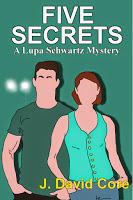 5 - T.D. Mercury's gender swap. The character of T.D. Mercury was conceived as a man. The made-up book T.D. Mercury wrote, The Green Table, is referenced in all of the preceding four books in one manner or another. At the time I wrote the previous books, I knew that Trinidad Darren Mercury was going to materialize in this installment of the series, but I had no idea what role T. D. was going to play in the plot. It wasn’t until I began outlining the story that I realized that T.D. was going to be a member of the Shossling family, and that she would be a woman.
5 - T.D. Mercury's gender swap. The character of T.D. Mercury was conceived as a man. The made-up book T.D. Mercury wrote, The Green Table, is referenced in all of the preceding four books in one manner or another. At the time I wrote the previous books, I knew that Trinidad Darren Mercury was going to materialize in this installment of the series, but I had no idea what role T. D. was going to play in the plot. It wasn’t until I began outlining the story that I realized that T.D. was going to be a member of the Shossling family, and that she would be a woman.
4 - Why Shossling? In the book, there is a family named Shossling who are members of an underground "New World Order" controlling dynasty. The name Shossling means sapling in German. I chose the name because of a French family known as the Plantards. A member of that clan claims that his family is part of a long-standing branch of the Morovingian dynasty. The word “plantard” is French for sapling.
3 - Patriarch swap! In the first book in the series, Extreme Unction, we are introduced to a neighbor of Schwartz’s named Zvi Moreck. The only thing we know about him in that book is that Schwartz doesn’t like him. He was initially conceived to be revealed in this book as the ultimate head of the secretive dynasty. His name is an amalgam of Moriarty, the villain from the Sherlock Holmes stories, and Zeck, the villain in the Nero Wolfe stories. However, although he remains a character in book one, I abandoned the idea of making him an arch-villain before I completed that first book, and the character has not appeared in any of the stories since. However, he will be making an appearance in the next book, a collection of short stories tentatively titled Hard Boiled. I won’t say more now, except to say readers may learn a little more about why Schwartz dislikes him.
2 - Schwartz's fat disguise. All of the books in this series carry on the conceit that Schwartz is the grandson of Nero Wolfe (the detective in a series of mystery novels by Rex Stout) which is itself based on the existing theory that Wolfe was the son of Sherlock Holmes. In the middle of this book, Schwartz allows himself to grow morbidly obese as part of a disguise when he goes undercover. This idea was itself borrowed from both the Holmes and Wolfe canons. Holmes has an obese brother named Mycroft, and Wolfe is himself morbidly obese. However, Holmes is extremely svelte and it is hinted that Wolfe was at one time quite thin. Therefore Schwartz’s ability to quickly gain and lose weight is an inherited family trait. His willingness to transform himself for a case is also a nod to Holmes who frequently altered his own appearance – often times quite drastically.
 1 - Why flowers? The cover for the paperback version of this book was shot at the Phipps Conservatory in Pittsburgh by my girlfriend. The books are set in Pittsburgh, so I thought it fitting to use a photo shot there; but the photo contains a very specific breed of flower. The yellowish white flowers and the pinkish flowers above them are orchids, a breed of flower favored by Nero Wolfe who grew them in specially built greenhouses on the roof of his Manhattan brownstone. So the cover is a double homage.
1 - Why flowers? The cover for the paperback version of this book was shot at the Phipps Conservatory in Pittsburgh by my girlfriend. The books are set in Pittsburgh, so I thought it fitting to use a photo shot there; but the photo contains a very specific breed of flower. The yellowish white flowers and the pinkish flowers above them are orchids, a breed of flower favored by Nero Wolfe who grew them in specially built greenhouses on the roof of his Manhattan brownstone. So the cover is a double homage.
For more info on Five Secrets and all of the other books in the series, click here.
 5 - T.D. Mercury's gender swap. The character of T.D. Mercury was conceived as a man. The made-up book T.D. Mercury wrote, The Green Table, is referenced in all of the preceding four books in one manner or another. At the time I wrote the previous books, I knew that Trinidad Darren Mercury was going to materialize in this installment of the series, but I had no idea what role T. D. was going to play in the plot. It wasn’t until I began outlining the story that I realized that T.D. was going to be a member of the Shossling family, and that she would be a woman.
5 - T.D. Mercury's gender swap. The character of T.D. Mercury was conceived as a man. The made-up book T.D. Mercury wrote, The Green Table, is referenced in all of the preceding four books in one manner or another. At the time I wrote the previous books, I knew that Trinidad Darren Mercury was going to materialize in this installment of the series, but I had no idea what role T. D. was going to play in the plot. It wasn’t until I began outlining the story that I realized that T.D. was going to be a member of the Shossling family, and that she would be a woman.4 - Why Shossling? In the book, there is a family named Shossling who are members of an underground "New World Order" controlling dynasty. The name Shossling means sapling in German. I chose the name because of a French family known as the Plantards. A member of that clan claims that his family is part of a long-standing branch of the Morovingian dynasty. The word “plantard” is French for sapling.
3 - Patriarch swap! In the first book in the series, Extreme Unction, we are introduced to a neighbor of Schwartz’s named Zvi Moreck. The only thing we know about him in that book is that Schwartz doesn’t like him. He was initially conceived to be revealed in this book as the ultimate head of the secretive dynasty. His name is an amalgam of Moriarty, the villain from the Sherlock Holmes stories, and Zeck, the villain in the Nero Wolfe stories. However, although he remains a character in book one, I abandoned the idea of making him an arch-villain before I completed that first book, and the character has not appeared in any of the stories since. However, he will be making an appearance in the next book, a collection of short stories tentatively titled Hard Boiled. I won’t say more now, except to say readers may learn a little more about why Schwartz dislikes him.
2 - Schwartz's fat disguise. All of the books in this series carry on the conceit that Schwartz is the grandson of Nero Wolfe (the detective in a series of mystery novels by Rex Stout) which is itself based on the existing theory that Wolfe was the son of Sherlock Holmes. In the middle of this book, Schwartz allows himself to grow morbidly obese as part of a disguise when he goes undercover. This idea was itself borrowed from both the Holmes and Wolfe canons. Holmes has an obese brother named Mycroft, and Wolfe is himself morbidly obese. However, Holmes is extremely svelte and it is hinted that Wolfe was at one time quite thin. Therefore Schwartz’s ability to quickly gain and lose weight is an inherited family trait. His willingness to transform himself for a case is also a nod to Holmes who frequently altered his own appearance – often times quite drastically.
 1 - Why flowers? The cover for the paperback version of this book was shot at the Phipps Conservatory in Pittsburgh by my girlfriend. The books are set in Pittsburgh, so I thought it fitting to use a photo shot there; but the photo contains a very specific breed of flower. The yellowish white flowers and the pinkish flowers above them are orchids, a breed of flower favored by Nero Wolfe who grew them in specially built greenhouses on the roof of his Manhattan brownstone. So the cover is a double homage.
1 - Why flowers? The cover for the paperback version of this book was shot at the Phipps Conservatory in Pittsburgh by my girlfriend. The books are set in Pittsburgh, so I thought it fitting to use a photo shot there; but the photo contains a very specific breed of flower. The yellowish white flowers and the pinkish flowers above them are orchids, a breed of flower favored by Nero Wolfe who grew them in specially built greenhouses on the roof of his Manhattan brownstone. So the cover is a double homage.For more info on Five Secrets and all of the other books in the series, click here.
Published on July 18, 2015 06:00



